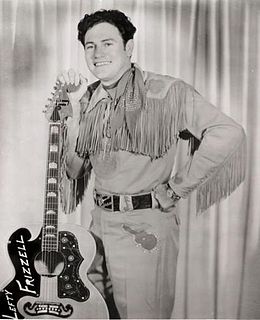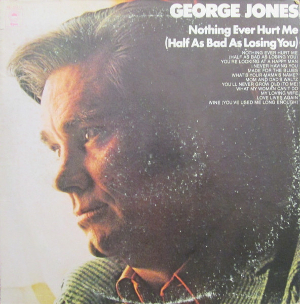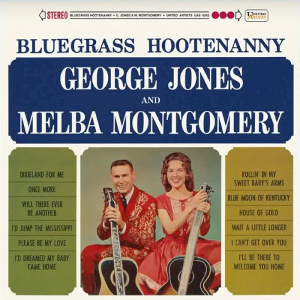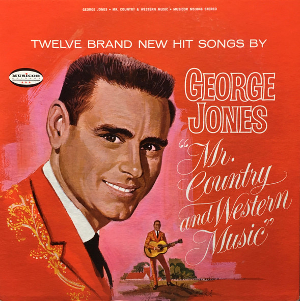
A honky-tonk is both a bar that provides country music for the entertainment of its patrons and the style of music played in such establishments. It can also refer to the type of piano used to play such music. Bars of this kind are common in the South and Southwest United States. Many eminent country music artists, such as Jimmie Rodgers, Loretta Lynn, Patsy Cline, Ernest Tubb, Johnny Horton, and Merle Haggard, began their careers as amateur musicians in honky-tonks. The modern-day honky-tonk atmosphere has continued with the likes of Dwight Yoakam, Turnpike Troubadours, and Mike and the Moonpies.

George Glenn Jones was an American musician, singer, and songwriter. He achieved international fame for his long list of hit records, including his best-known song "He Stopped Loving Her Today", as well as his distinctive voice and phrasing. For the last 20 years of his life, Jones was frequently referred to as the greatest living country singer. Country music scholar Bill Malone writes, "For the two or three minutes consumed by a song, Jones immerses himself so completely in its lyrics, and in the mood it conveys, that the listener can scarcely avoid becoming similarly involved." Waylon Jennings expressed a similar opinion in his song "It's Alright": "If we all could sound like we wanted to, we'd all sound like George Jones." The shape of his nose and facial features earned Jones the nickname "The Possum". George Jones has been called "The Rolls Royce Of Country Music" and had more than 160 chart singles to his name from 1955 until his death in 2013.

William Orville "Lefty" Frizzell was an American country music singer-songwriter and honky-tonk singer.
Country USA was a 23-volume series issued by Time-Life Music during the late 1980s and early 1990s, spotlighting country music of the 1950s through early 1970s.

One Woman Man is an album by American country music artist George Jones, released on February 28, 1989 on Epic Records.

Memories of Us is an album by American country music artist George Jones, released in 1975 on the Epic Records label. It peaked at #43 on the Billboard Country Albums chart.

Nothing Ever Hurt Me is an album by country music artist George Jones released in 1973, on the Epic Records label. It peaked at number 12 on the Billboard Country Albums chart.

George Jones Sings the Great Songs of Leon Payne is an album by American country music artist George Jones, released in 1971 on the Musicor Records label containing nine Leon Payne covers and one Jones co-write with Payne, "Take Me". Eight of the ten songs on this album had been released on earlier Jones albums. Of those eight, three were re-recorded in 1970 and included here, and the other five are just re-releases of the original 1960s recordings. The two previously unreleased songs, "Brothers of a Bottle" and "Lifetime to Regret", were also recorded in 1970. This was the last Jones "studio" album that was released by Musicor as he had already signed with Epic Records.

I'm a People is an album by American country music artist George Jones. It was released in 1966 on the Musicor Records label. The album hit number one on the country chart. George Bedard of AllMusic writes, "One of the more consistent Musicor offerings, it features a good mix of uptempo honky tonk and novelty, ballads, and sacred songs. "Four-O-Thirty Three" and the title track were both top ten country hits. I'm A People also includes the "World Of Forgotten People" written by fellow country star Loretta Lynn. In his essay for the 1994 Sony compilation The Essential George Jones: The Spirit of Country, Rich Kienzle observes that the Dallad Frazier-penned title track contains an arrangement "clearly designed to imitate Roger Miller's hit novelties. George even attempted to scat-sing as Miller often did on his own hits."

Country Heart is an album by American country music artist George Jones. It was released in 1966 as a double LP on the Musicor Records label, and was available exclusively through the Columbia Record Club.

Famous Country Duets is an album by American country music artist George Jones with Gene Pitney and Melba Montgomery. This album was released in 1965 on the Musicor Records label.

Bluegrass Hootenanny is an album by American country music artists George Jones and Melba Montgomery released in 1964 on the United Artists Records.

I Wish Tonight Would Never End is an album by American country music artist George Jones. It was released in 1963 on the United Artists record label.

My Favorites of Hank Williams is an album by American country music artist George Jones. It was released in 1962 on the United Artists record label. It was Jones' second tribute to the music of Hank Williams.

"Why Baby Why" is the title of a country music song co-written and originally recorded by George Jones. Released in late 1955 on Starday Records and produced by Starday co-founder and Jones' manager Pappy Daily, it peaked at 4 on the Billboard country charts that year. It was Jones' first chart single, following several unsuccessful singles released during the prior year on Starday.

Columbus Stockade Blues is a 1970 compilation album by country singer Willie Nelson. It was his first release in the 1970s.

Country Favorites-Willie Nelson Style is the fourth studio album by country singer Willie Nelson. He recorded it with Ernest Tubb's band, the Texas Troubadours and Western Swing fiddler-vocalist Wade Ray with studio musicians Jimmy Wilkerson and Hargus "Pig" Robbins. At the time of the recording, Nelson was a regular on a syndicated TV show hosted by Tubb.
Arthur Leo "Doodle" Owens was an American country music songwriter and singer. He had a long songwriting partnership with Dallas Frazier, with whom he wrote "All I Have to Offer You " (1969), "(I'm So) Afraid of Losing You Again" (1969), "I Can't Believe That You've Stopped Loving Me" (1970) and "Then Who Am I" (1974), all number-one country hits for Charlie Pride. In the 1980s, Owens wrote many songs with fellow songwriter Dennis Knutson for George Jones and other artists.
Blue & Lonesome is an album by American country music artist George Jones released in 1964 on the Mercury Records label.
"Out of Control" is a song by George Jones. It was released as a single on Mercury Records in 1960.
















